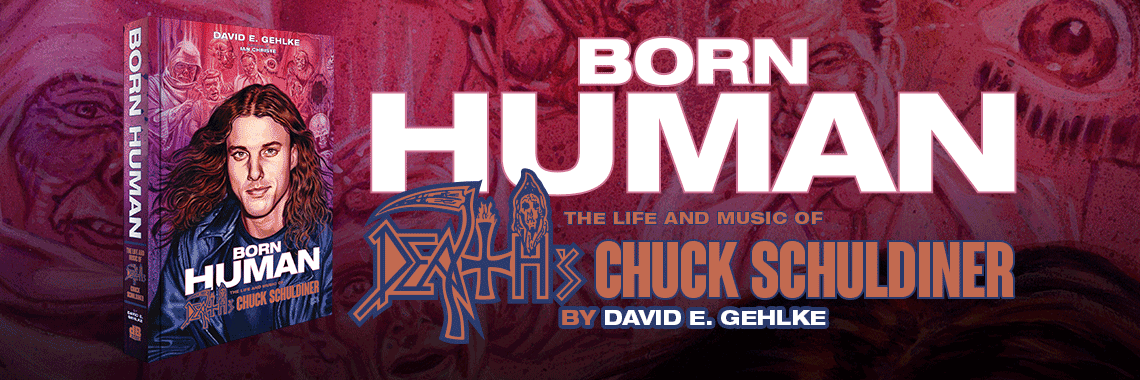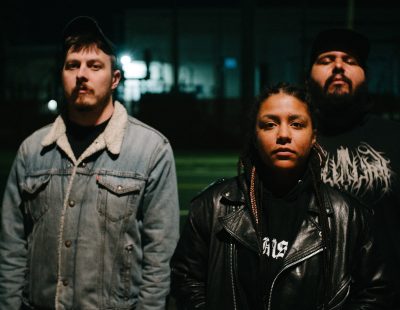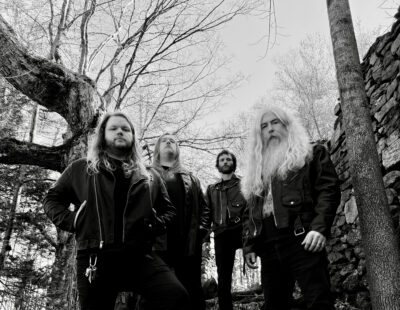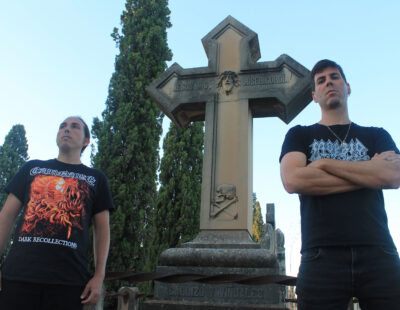** Back in August, Decibel premiered new Twilight of the Gods tune, “Destiny Forged in Blood.” Click HERE to listen. Since then, we’ve imbibed heavily on debut album, Fire on the Mountain, which is the product of guys and ex-guys from Dimmu Borgir, Einherjer, Thyrfing, and, of course, Primordial saluting age-old heavy metal with a slight pagan edge. Enjoy the following chat with the ever-serious, always approachable Alan Averill, vocalist and spiritual center to Twilight of the Gods.
How did you guys meet to discuss Twilight of the Gods in the first place?
Alan Averill: The idea came from a discussion over a beer or two with a friend about Primordial possibly doing a set of epic Bathory tracks to commemorate our 20th anniversary. I realized this was pretty unlikely so he more or less made me a bet to put a band together and do exactly that so I cast the net out and here we are a couple of years later. An interesting journey.
You did the Bathory cover shows. What were those like?
Alan Averill: For the most part great, a few difficult moments at the beginning as our first shows were scheduled during the volcano ash period across Europe so scheduled rehearsals didn’t happen etc. so we played a little blind the first time but we finished off at Ragnarok festival in Germany, more or less the spiritual home of pagan metal in Europe which was great.
At what stage did the idea to carry Twilight of the Gods—the concept and name—from cover band to a band with original songs?
Alan Averill: Well, firstly it’s a killer name, no harm in that and secondly seeing as we had done some work under that name we decided to keep it, we had already built up a small head of steam with the moniker and the story shouldn’t be that hard to follow. On tour together we talked about trying to write some songs and we agreed to not continue if the chemistry wasn’t there, but it worked.
There isn’t much Bathory in Twilight of the Gods. At least not the black metal iteration of Bathory. Was the group interested in carrying the Bathory torch at first and then moved on to classic heavy metal?
Alan Averill: Well, of course not, those were not the Bathory songs we covered in the first place. We mainly concentrated on stuff from Hammerheart and Twilight, so of course it doesn’t sound like The Return. That’s been done by many other bands anyway. For me there is moments of the epic Bathory here and there but to be honest Bathory has been such a huge influence on for example Primordial, Thyrfing and Einherjer to begin with it wouldn’t make sense to create another band in the same vein.
How quickly did the songwriting come together? The album flows naturally.
Alan Averill: Totally. We met in a villa in southern Portugal during the winter and spent all day working on the songs. No file trading or anything of the sort. We just worked on riffs and ideas and demoed a whole album.
I think your vocals work well in this format. How differently did you approach the vocals for TOTG than, say, Primordial?
Alan Averill: I was freer to be honest. The siren style higher vocals don’t really fit into Primordial so I had a free hand to more or less do as I pleased. I didn’t want typical power metal vocals and I’m not that kind of singer anyway so it came naturally. We’ve all grown up with music just like this for decades, it’s primal and innate.
“Destiny Forged in Blood” is a natural opener. Did you know immediately that “Destiny Forged in Blood” would open the record?
Alan Averill: No, not at all to be honest. Now it seems like the most logical choice but at the time there was some discussion. Personally I rather start with an up-tempo no-bullshit kick to the head and set out the stall musically straight away and not confuse things with long winded intros and a slower number.
Explain some of the lyrical topics? Are they serious or light-hearted? A lot of classic heavy metal melded the two, if I remember correctly.
Alan Averill: You really expect light-hearted from me? After all these years? I couldn’t do it if I tried. So there’s no one-for-all, all-for-one lyrics, no unicorns, dragons or escapism. They are written in the language of metal and there are big choruses as well, so on one level it can work live at a festival for people to get into; it’s not exclusive music but if you want some meaning it is there. The title track for example is about the 1698 siege of Vienna by the Ottoman Empire, “Sword of Damocles” is about the Cold War and nuclear arms race.
Where’d the title Fire on the Mountain come from?
Alan Averill: Ah, I was in America and we were stopped at some tiny town somewhere in Virginia and there was a massive old road sign for some rundown theme park or something like that and I remember thinking what a Rainbow/Dio-esque title it was so I just ran with it. Fits the album artwork actually really well.
How does the anecdote for “Sword of Damocles” fit in with today’s world? Could be heavy metal or politics or life in general.
Alan Averill: Like I said above, it’s about this quote from Kennedy “we are all living under the nuclear Sword of Damocles” and refers to the Cuban missile crisis. The lyric in general is about the cold war and nuclear stockpiling yet the chorus is, “we are the sons of the hammer / the neutron hammer.” Catchy metal chorus.
Do you see TOTG continuing on after Fire on the Mountain?
Alan Averill: Sure, why not. I’m under no illusions about how an album like this could fall through the cracks in a crowded market place and this is not cool kid hipster heavy metal with the right moustaches, skinny jeans, trucker caps and neck tattoos, this is not Mercyful Fate worship nor is it wink wink nod nod ironic metal, this is forged in the template of Heaven and Hell-era Sabbath, Priest, Dio, Accept, old Manowar. It’s not To the Nameless Dead, or Orda Ab Chao. It’s heavy metal, nothing more and nothing less.
** Twilight of the Gods’ new album, Fire on the Mountain, is out now on Season of Mist. It’s available HERE. Or you can get your little Cherrybutt & Firefly tushy over to Amazon if international shipping scares the stitches out of your undies.






